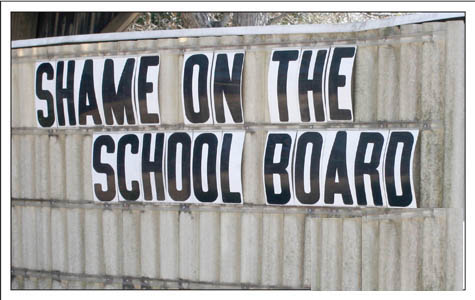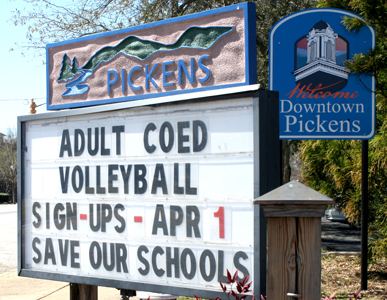Board members move forward with plan to close Pickens-area schools

A sign outside a Pickens business admonishes Pickens County School Board members after they voted last week to close two Pickens-area elementary schools.
Pamela Dodson/Courier
By Rocky Nimmons
Publisher
rnimmons@thepccourier.com
Saitta calls for issue to be decided by county voters
EASLEY — Despite the continued efforts to halt the closing of A.R. Lewis and Holly Springs elementary Schools by Pickens County School Board trustees Alex Saitta and Henry Wilson, the closure continues to move forward with the announcement of administration for the new configuration in the Pickens area.
District officials announced Tuesday morning that current Holly Springs principal Donna Harden will be the new principal of Pickens Elementary School next year, while current Pickens principal Allen Fain will become the district’s director of Adult Education in 2017 after working with current director Mary Gaston for a year.
Meanwhile, A.R. Lewis principal Melissa Terry’s role with the district for next school year is undetermined, officials said, although she will “work closely with the other Pickens-area principals to ensure a smooth merger process.”
Last Monday, the board voted 4-2, with only Saitta and Wilson opposing, to approve the closure of the two mountain schools.

Pamela Dodson/Courier
A number of signs around the Pickens community, including this one at Legacy Square, urge action from local residents to keep the doors open at A.R. Lewis and Holly Springs elementary schools. School board member Alex Saitta has proposed a plan to put the matter before voters in the November election.
The move has not sat well with local residents, who have made it very clear that closure was not what the people of the two effected communities want.
As this Monday’s meeting started, Johnnelle Raines spoke during time set aside for public input and said she was there to let the four school board members who voted to close the two small rural schools — Edwards, Herbert Cooper, Brian Swords and Phillip Bowers — know that Conservatives of the Upstate members, along with parents of the schools affected, aren’t going down without a fight.
“The state of South Carolina is ultimately the one responsible for education in South Carolina, and hopefully after many phone calls with our phone blitz they will be looking into the wrongness of this decision,” Raines told board members. “We have reached out to our Pickens Legislative Delegation, and they should be fighting alongside of us for a remedy to your gross negligent decision as well.”
Raines said the group is seeking legal advice and action and has set up a CrowdRise fundraising account online to share the expense of hiring a lawyer for advice and action.
“What you for did was morally wrong for sure,” she told the board. “You have destroyed our confidence in your abilities to serve our county’s best interest of doing what is best for children. We will hold you accountable.
“Even if a lawyer says we have no case, just know that your names are mud in Pickens County and you won’t be re-elected to this office or any other office you plan on seeking in our county.”
Following Raines at the podium, Donald Joslyn asked for a audit of the bus routes currently being used, saying that some are claiming some routes are in violation of the state policy for allowed student time being bused to and from school.
As the meeting continued, Saitta asked to amend the agenda to discuss the idea of a referendum on not closing the schools, but the motion was voted down again by a 4-2 vote, with members saying they did not have enough time or information to discuss the issue and that an agenda could not legally be changed the night of the meeting.
Saitta then made a motion to hold a special called meeting on Thursday of this week. Before the vote, Swords amended the motion to allow the topic to be discussed at the next monthly board meeting on April 11.
Saitta said his concern was that the process of closing the schools was moving forward, and his thinking was if they were serious about the referendum idea of not closing schools, they would want to talk about it right away, not wait until April, when the process of closing those schools will be well on its way.
“Brian (Swords) talks about building trust,” Saitta said. “Actions build and tear down trust, not words. This killed public trust with the strongest supporters of the system — teachers, PTA volunteers, alumni. This action would be a way to repair this.”
Saitta laid out three options he would like to see on the possible referendum.
The first option was a plan posed to the facilities committee, which would place an extra 1 percent tax on all retail items, with exemptions for items like groceries or newspapers.
“That would raise the $12 million the committee talked about,” Saitta said. “The school district would get $7 million a year for capital maintenance. $12 million less the $7 million would mean $5 million would go to lower the property tax rate on debt (12 mills). The $3.25 million refinancing savings doesn’t need to be paid back. Instead of taking that savings and spending it like we do now, we’d no longer need it, so that would flow back to the taxpayers, reducing the tax rate another 7.5 mills.
“In the committee’s plan, the school district gets $7 million a year and property taxes come down nearly 20 mills.”
The second option Saitta suggested was the current plan — to close A.R. Lewis and Holly Springs, and possibly more schools.
His final option was to keep all schools open and fund them with the money the district currently has.
“This way the people get to choose, all three points of view are on the ballot (and) you have the possibility for much higher revenue,” he said. “And it adds fairness to a process that doesn’t look fair to anyone.”
The amended motions were then passed to discuss the matter in depth at the April 11 meeting, but Edwards said that the process of closing the schools will go on as planned.
According to district attorneys, even if the board voted to seek a referendum for the November ballot, they would not see any revenue from a tax increase until about six months after the measure passed.
Saitta questioned whether hs fellow board members wanted to close the schools for a year with the possibility of moving all the students back a year later if the voters decided to keep them open.
“That is why we want to maintain the schools for at least a year,” Bowers said.
“Yes, if that is what the voters decide if we hold a referendum,” Edwards added.
In an email to the Courier later Monday night, Bowers said he was glad to hear Saitta’s motion.
“I’m thankful he has realized what I did several months ago when I took over the facilities committee,” Bowers said. “His proposal tonight highlights what I have been saying for weeks — the financial numbers do not work for the long-term health of the district. We must cut expenses or raise revenue. Mr Saitta’s proposal tonight to raise revenue through the penny tax is one option that may work.”



























